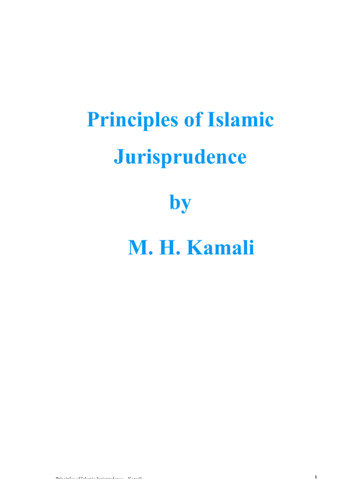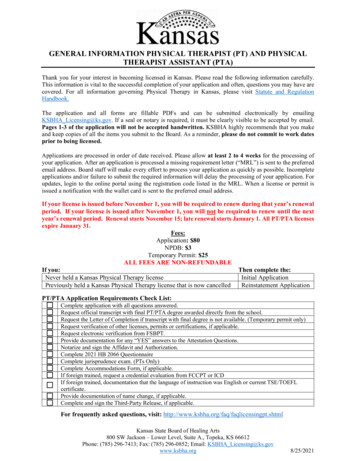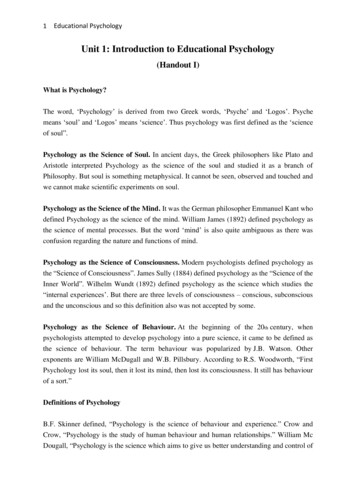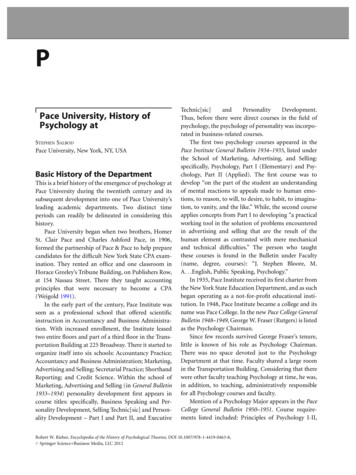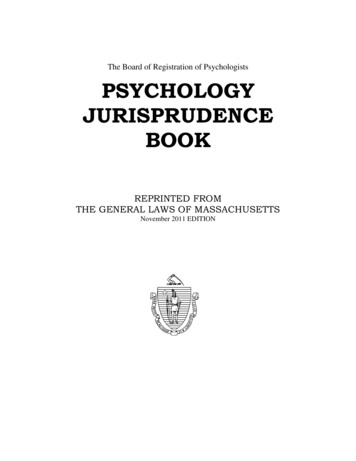
Transcription
The Board of Registration of PsychologistsPSYCHOLOGYJURISPRUDENCEBOOKREPRINTED FROMTHE GENERAL LAWS OF MASSACHUSETTSNovember 2011 EDITION
TABLE OF CONTENTSPAGEChapter 19A, sections 14-26(Elder abuse)Chapter 19C, sections 1-13(Protection of disabled persons)Chapter 112, section 12CC(Duty to provide records)Chapter 112, sections 118-129(Registration and licensing of psychologists)Chapter 112, sections 129A, 129B, 65A(Confidentiality of psychologist-patient communications;restrictive covenants; unlicensed practice of trade)Chapter 119, sections 1-84(protection and care of children, proceedings against them)Chapter 123, sections 1-36B(Mental health: commitment, admissions, treatment, anti-psychoticmedication, restraint, duty to warn, etc.)Chapter 123A, sections 1-16(Care and treatment of sexually dangerous persons)General information regarding guardianships and conservatorshipsChapter 190B(Guardians and conservators)Chapter 233, section 20B(Privileged communication)Chapter 208 (selected sections)(Divorce)104 CMR 33.01 - 33.05(Mental health, qualified, designated, designated forensicpsychologists)251 CMR 1.00-4.00(Board of Registration of Psychologists regulations)191920262983111120122153155161166
Psychology Jurisprudence BookDepartment of Elder AffairsChapter 19A, sections 14-26GENERAL LAWS OF MASSACHUSETTSCHAPTER 19A. DEPARTMENT OF ELDER AFFAIRSChapter 19A, Section 14. Definitions applicable to secs. 14--26.Chapter 19A, Section 15. Reports of abuse; liability.Chapter 19A, Section 16. Protective services system.Chapter 19A, Section 17. Protective services agencies; authorized activities.Chapter 19A, Section 18. Assessment and evaluation of reports; investigations; arrangement for protective services.Chapter 19A, Section 19. Consent to protective services; interference with provision of services.Chapter 19A, Section 20. Lack of capacity to consent to protective services; hearings; emergency orders; placementor commitment.Chapter 19A, Section 21. Geriatric evaluation process.Chapter 19A, Section 22. Financial eligibility guidelines; reimbursements by elderly persons.Chapter 19A, Section 23. Records; disclosure; destruction; regulations; penalties.Chapter 19A, Section 24. Reports.Chapter 19A, Section 25. Rules and regulations.Chapter 19A, Section 26. Powers and responsibilities of other departments or agencies.Chapter 19A: Section 14. Definitions applicable to sections 14 to 26Section 14. For the purposes of sections fourteen to twenty-six, inclusive, the following words and termsshall, unless the context otherwise requires, have the following meaning:"Abuse'', an Act or omission which results in serious physical or emotional injury to an elderly person orfinancial exploitation of an elderly person; or the failure, inability or resistance of an elderly person toprovide for him one or more of the necessities essential for physical and emotional well-being withoutwhich the elderly person would be unable to safely remain in the community; provided, however, that noperson shall be considered to be abused or neglected for the sole reason that such person is beingfurnished or relies upon treatment in accordance with the tenets and teachings of a church or religiousdenomination by a duly accredited practitioner thereof."Caretaker'', the person responsible for the care of an elderly person, which responsibility may arise as theresult of a family relationship, or by a voluntary or contractual duty undertaken on behalf of an elderlyperson, or may arise by a fiduciary duty imposed by law."Conservator'', a person who is appointed to manage the estate of a person pursuant to chapter twohundred and one."Court'', the probate and family court."Department'', the department of elder affairs."Elderly person'', an individual who is sixty years of age or over."Emergency'', a situation in which an elderly person is living in conditions which present a substantialrisk of death or immediate and serious physical or mental harm."Financial exploitation'', an act or omission by another person, which causes a substantial monetary orproperty loss to an elderly person, or causes a substantial monetary or property gain to the other person,which gain would otherwise benefit the elderly person but for the act or omission of such other person;1
Psychology Jurisprudence BookDepartment of Elder AffairsChapter 19A, sections 14-26provided, however, that such an act or omission shall not be construed as financial exploitation if theelderly person has knowingly consented to such act or omission unless such consent is a consequence ofmisrepresentation, undue influence, coercion or threat of force by such other person; and, providedfurther, that financial exploitation shall not be construed to interfere with or prohibit a bona fide gift by anelderly person or to apply to any act or practice in the conduct of any trade or commerce declaredunlawful by section two of chapter ninety-three A."Guardian'', a person who has qualified as a guardian of an elderly person pursuant to chapter twohundred and one, but shall not include a guardian ad litem."Protected person'', an elderly person for whom a conservator or guardian has been appointed or otherprotective order has been made."Protective services'', services which are necessary to prevent, eliminate or remedy the effects of abuse toan elderly person."Protective services agency'', a public or nonprofit private agency, corporation, board, or organizationdesignated by the department pursuant to this chapter to furnish protective services to elderly persons.Chapter 19A: Section 15. Reports of abuse; liabilitySection 15. (a) Any physician, physician assistant, medical intern, dentist, nurse, family counselor,probation officer, social worker, policeman, firefighter, emergency medical technician, licensedpsychologist, coroner, registered physical therapist, registered occupational therapist, osteopath,podiatrist, director of a council on aging, outreach worker employed by a council on aging, executivedirector of a licensed home health agency or executive director of a homemaker service agency ormanager of an assisted living residence who has reasonable cause to believe that an elderly person issuffering from or has died as a result of abuse, shall immediately make a verbal report of suchinformation or cause a report to be made to the department or its designated agency and shall within fortyeight hours make a written report to the department or its designated agency. Any person so required tomake such reports who fails to do so shall be punished by a fine of not more than one thousand dollars.(b) The executive director of a home care corporation, licensed home health agency or homemakerservice agency shall establish procedures within such agency to ensure that homemakers, home healthaides, case managers or other staff of said agency who have reasonable cause to believe that an elderlyperson has been abused shall report such case to the executive director of the corporation or agency. Theexecutive director shall immediately make a verbal report of such information or cause a report to bemade to the department or its designated agency and shall within forty-eight hours make a written reportto the department or its designated agency.(c) In addition to a person required to report under the provisions of subsection (a) of this section, anyother person may make such a report to the department or its designated agency, if any such person hasreasonable cause to believe that an elderly person is suffering from or has died as a result of abuse.(d) No person required to report pursuant to the provisions of subsection (a) shall be liable in any civil orcriminal action by reason of such report; provided, however, that such person did not perpetrate, inflict orcause said abuse. No other person making such a report pursuant to the provisions of subsection (b) or (c)shall be liable in any civil or criminal action by reason of such report if it was made in good faith;provided, however, that such person did not perpetrate, inflict or cause said abuse. Any person making areport under subsection (a), (b) or (c) who, in the determination of the department or the district attorneymay have perpetrated, inflicted or caused said abuse may be liable in a civil or criminal action by reason2
Psychology Jurisprudence BookDepartment of Elder AffairsChapter 19A, sections 14-26of such report. No employer or supervisor may discharge, demote, transfer, reduce pay, benefits or workprivileges, prepare a negative work performance evaluation, or take any other action detrimental to anemployee or supervisee who files a report in accordance with the provisions of this section by reason ofsuch report.(e) Reports made pursuant to subsections (a) and (b) shall contain the name, address and approximate ageof the elderly person who is the subject of the report, information regarding the nature and extent of theabuse, the name of the person’s caretaker, if known, any medical treatment being received or immediatelyrequired, if known, any other information the reporter believes to be relevant to the investigation, and thename and address of the reporter and where said reporter may be contacted, if the reporter wishes toprovide said information. The department shall publicize the provisions of this section and the process bywhich reports of abuse shall be made.(f) Any privilege established by sections one hundred and thirty-five A and one hundred and thirty-five Bof chapter one hundred and twelve or section twenty B of chapter two hundred and thirty-three relating tothe exclusion of confidential communications shall not prohibit the filing of a report pursuant to theprovisions of subsection (a), (b) or (c).Chapter 19A: Section 16. Protective services systemSection 16. (a) Subject to appropriation, the department shall develop a coordinated system of protectiveservices for elderly persons who are determined to be abused. In planning this system, the departmentshall require input from the department of social services, the existing protective service agencies andother agencies currently involved in the provision of social, health, legal, nutritional, and other services tothe elderly, as well as elderly advocacy organizations.(b) Within this protective services system, the department shall establish a mechanism for the receipt ofreports made pursuant to section fifteen which shall operate and be accessible on a twenty-four hour perday basis. If the department or its designated agency has reasonable cause to believe that an elderlyperson has died as a result of abuse, the death shall be reported immediately to the district attorney of thecounty in which the abuse occurred. Within forty-five days of the receipt of a report made pursuant tosubsection (a) of said section fifteen, the department or its designated agency shall notify the reporter, inwriting, of its response to the report. Such notification shall be made to a person who makes a reportpursuant to subsection (c) of said section fifteen if said reporter so requests.(c) Subject to appropriation, the department shall designate at least one local agency to act on behalf ofthe department with a geographic area as defined by the department. The department may designate anypublic agency or private nonprofit organization which has the capacity to implement a service planthrough direct access to social, health and mental health services. The department shall utilize existingresources and services of public and nonprofit private agencies in providing protective services. Thedepartment shall insure that assessment, evaluation and service delivery shall be provided through thedesignated local agency closest to the elderly person's community.In designating agencies, the department shall insure that: (1) persons conducting assessment, evaluationand service delivery have demonstrated experience in providing protective and other social healthservices to elders, have these protective functions as their primary employment responsibility, and haveother professional qualifications as determined by the secretary; (2) continuity of care under oneprotective services worker is assured throughout assessment, evaluation and services delivery to theextent possible; and (3) the department and the designated agencies have the capacity to respond to anemergency and provide or arrange for services to alleviate the immediate danger of abuse of an elderlyperson on twenty-four hours per day basis.3
Psychology Jurisprudence BookDepartment of Elder AffairsChapter 19A, sections 14-26The department shall monitor assessments, evaluations and the provision of protective services bydesignated local agencies.(d) The department shall issue regulations establishing criteria and procedures for the designation ofprotective services agencies or for the termination or designation or redesignation of protective servicesagencies.(e) The department shall be responsible for continuing coordination and supervision of the system. Incarrying out these duties, the department shall, subject to appropriation: (1) adopt rules and regulationsfor the system; (2) continuously monitor the effectiveness of the system and perform evaluative researchabout it; and (3) utilize grants from federal, state and other public and private sources to support thesystem.Chapter 19A: Section 17. Protective services agencies; authorized activitiesSection 17. A protective services agency is authorized:(1) to receive and investigate reports of abuse;(2) to furnish protective services to an elderly person with his or her consent;(3) to petition the court for appointment of a conservator or guardian or for issuance of an emergencyorder for protective services;(4) to furnish protective services to an elderly person on an emergency basis as hereinafter provided;(5) to furnish protective services to a protected person with the consent of such person's guardian orconservator;(6) to serve as conservator, guardian, or temporary guardian of a protected person; and(7) to perform all other functions determined by the department to be necessary for the administration ofthis chapter.Chapter 19A: Section 18. Assessment and evaluation of reports; investigations;arrangement for protective servicesSection 18. (a) The department or its designated agency shall assess and evaluate the information reportedpursuant to the provisions of section fifteen.Such assessment shall include a visit to the residence of the elderly person who is the subject of the reportand may include consultations with appropriate service agencies and individuals who have knowledge ofthe elderly person’s situation including the person filing the report. The elderly person who is the subjectof the report shall receive written notice that an assessment is being conducted and shall have the right toreview the file and report developed as a result of the assessment.If the assessment results in a determination that the elderly person is suffering from abuse, the departmentor the designated agency shall evaluate the elderly person’s functional capacity, situation, and resourcesand shall develop a service plan for the provision of protective services. Said plan shall be appropriate tothe needs of the elderly person and shall utilize the least restrictive alternatives.4
Psychology Jurisprudence BookDepartment of Elder AffairsChapter 19A, sections 14-26The department shall adopt rules and regulations establishing time limits for the completion ofassessments and evaluations and for the implementation of service plans; provided, however, that if anemergency exists, assessments shall be completed within twenty-four hours of the receipt of the report.If an assessment results in a determination that the elderly person has suffered serious abuse, thedepartment or designated agency shall report such determination to the district attorney of the countywhere the abuse occurred within forty-eight hours. The district attorney may investigate and decidewhether to initiate criminal proceedings.(b) The department or the designated agency shall provide or arrange for protective services inaccordance with the service plan developed pursuant to the provisions of subsection (a). Protectiveservices shall include, but not be limited to, the following: the capacity to respond to an emergency;protective services case work; the capacity to provide or arrange for a homemaker, home-health aide,transportation, legal assistance, counseling, nutrition services, guardianship and conservatorship,protective order through the court, emergency shelter, foster care, and adult day care services.The department or the designated agency is authorized to arrange for additional services necessary toassist and protect elderly persons who have been abused, including, but not limited to, the following:medical care, mental health care and emergency financial assistance.Chapter 19A: Section 19. Consent to protective services; interference with provision ofservicesSection 19. (a) Any elderly person who requests or affirmatively consents to the receipt of protectiveservices may receive said services. If the person withdraws or refuses consent, the service shall not beprovided or continued except as provided in section twenty.(b) No person shall interfere with the provision of protective services to an elderly person who requests orconsents to receive such services. In the event that interference occurs on a continuing basis, thedepartment, a protective services agency, or the public guardian may petition the court to enjoin suchinterference.Chapter 19A: Section 20. Lack of capacity to consent to protective services; hearings;emergency orders; placement or commitmentSection 20. (a) If the department or its designated agency has reasonable cause to believe that an elderlyperson is suffering from abuse and lacks the capacity to consent to the provision of protective services,the department or its designated agency may petition the court for a finding that the elderly person isincapable of consenting to the provision of protective services. Said petition shall set forth the specificfacts upon which the department or the designated agency relied in making the determination. The courtshall hold a hearing on the matter within fourteen days of the filing of the petition. The court shall givenotice to the elderly person who is the subject of the petition at least five days prior to the date set for thehearing. The elderly person who is the subject of the petition shall have the right to be present, berepresented by counsel, present evidence, and examine and cross-examine witnesses. If the elderly personwho is the subject of the petition is indigent, the court shall appoint counsel to represent such elderlyperson. If the court determines that the elderly person lacks the capacity to retain counsel or waive theright to counsel, the court shall appoint a guardian ad litem to represent the interests of such elderlyperson. If, after hearing, the court determines, based on the preponderance of the evidence, that suchelderly person has been abused, is in need of protective services and lacks the capacity to consent and noother person who is authorized to consent is available or willing to consent, the court may appoint aconservator, guardian or other person authorized to consent to the provision of protective services;provided, however, that the court shall establish the least restrictive form of fiduciary representation that5
Psychology Jurisprudence BookDepartment of Elder AffairsChapter 19A, sections 14-26will satisfy the needs of such elderly person. In addition to or in the alternative, the court may issue anorder requiring the provision of services. The order shall contain a specific description of the services tobe provided and insure that the least restrictive alternatives are utilized. An order for protective servicesfor an elderly person pursuant to this subsection shall remain in effect for a period of six months, unlessotherwise stipulated in such order. The court may, for good cause shown, extend an order for protectiveservices. Such extension shall remain in effect for a period of six months, unless otherwise stipulated insuch order.(b) If an emergency exists and the department, its designated agency, a member of the immediate familyor a caretaker has reasonable cause to believe that an elderly person is suffering from abuse and lacks thecapacity to consent to the provision of protective services, said department, designated agency, memberof the immediate family or caretaker may petition the court for an emergency order of protective services.The court shall give notice to the elderly person who is the subject of the petition at least twenty-fourhours prior to the hearing. The court may dispense with notice upon finding that immediate andreasonable foreseeable physical harm to the individual or others will result from the twenty-four hourdelay and that reasonable attempts have been made to give such notice. If the elderly person who is thesubject of the petition is indigent, the court shall appoint counsel to represent such elderly person. If afterthe hearing, the court determines, based on the preponderance of the evidence, that the elderly person hasbeen or is being abused, that an emergency exists, and that the elderly person lacks the capacity to consentto the provision of services, the court may order the provision of protective services on an emergencybasis. The court shall order only those services necessary to remove the conditions creating theemergency and shall specially designate the authorized services in its order. If the court determines thatthe elderly person lacks the capacity to retain counsel or waive the right to counsel, the court shall appointa guardian ad litem to represent the interest of such elderly person following the entry of such emergencyorder. The order for emergency protective services shall remain in effect for a period not to exceedfourteen days. Said order may be extended for an additional period not to exceed fourteen days if thecourt finds that the extension is necessary to remove the emergency.(c) The court shall not order an institutional placement or change of residence unless it finds that no lessrestrictive alternative will meet the needs of the elderly person. No elderly person may be committed to amental health facility pursuant to this chapter. The elderly person or his or her court-appointedrepresentative, the department, or the designated agency may petition to have any order issued pursuant tosubsection (a) or (b) set aside or modified at any time.Chapter 19A: Section 21. Geriatric evaluation processSection 21. (a) Subject to appropriation, the department shall establish a geriatric evaluation process forthe purpose of conducting a comprehensive physical, mental, or social evaluation of an elderly person forwhom a petition has been filed in a court for appointment of a conservator or guardian, under theprovisions of clause (3) of section seventeen, or for an emergency order for protective services.(b) The evaluation of an elderly person conducted by the geriatric evaluation process shall include at leastthe following:(1) the name and address of the place where the person is residing and of the person or agency, if any,who is providing services at present;(2) a description of the treatment and services, if any, presently being provided to the person;(3) an evaluation of the person's present physical, mental, and social conditions; and(4) a recommendation concerning the least restrictive course of services, care or treatment consistent withthe person's needs.6
Psychology Jurisprudence BookDepartment of Elder AffairsChapter 19A, sections 14-26(c) Subject to appropriation, the cost of this evaluation shall be borne by the department.(d) Such elderly person shall have the right, at his own expense to secure an independent medical andpsychological or psychiatric examination relevant to the issue involved in any hearing under this sectionand to present a report of his independent evaluation or the evaluator's personal testimony as evidence atthe hearing.Chapter 19A: Section 22. Financial eligibility guidelines; reimbursements by elderlypersonsSection 22. The department shall establish, by regulation, financial eligibility guidelines which provide aprocedure for reimbursement by elderly persons for all or part of cost of protective services. If thedepartment or the designated agency determines, pursuant to section eighteen, that an elderly person whois in need of protective services has sufficient resources to pay for part or all of the cost of protectiveservices, it shall initiate said procedures for reimbursement. If the department or designated agencydetermines that an elderly person does not have sufficient resources, no reimbursement for any such costsshall be charged to the elderly person.No elderly person shall be required to reimburse the department for part or all of the cost of protectiveservices unless he or she has been notified prior to the commencement of service provision that areimbursement will be charged. No elderly person shall be required to reimburse the department forprotective services before service provision commences.Chapter 19A: Section 23 Records; disclosure; destruction; regulations; penaltiesSection 23. (a) Except as otherwise provided in this section, all records containing personal data whichare created, collected, used, maintained or disseminated pursuant to this chapter shall not be publicrecords, and shall be governed by the provisions of chapter sixty-six A, the notice provisions of sectionsixty-three of chapter thirty and the enforcement provisions of section three B of chapter two hundred andfourteen.(b) If the department, any designated agency, or any other agency obligated to make an assessment underthis chapter determines that the allegations in a report cannot be substantiated, it shall within 3 years ofsuch determination, either (i) destroy said report and any other records containing personal data createdbecause of the receipt of said report or (ii) physically remove therefrom all personal identifiers; provided,however, that the department, the designated agency or any other agency obligated to make assessmentsmay create and hold whatever statistical records it needs for purposes of planning and reporting, as maybe prescribed by regulations adopted by the department pursuant to section two of chapter thirty. Eachgovernment agency shall promulgate regulations prescribing the manner of creating and holding its ownsuch statistical records, and the department shall adopt such regulations for itself and any designatedagency. Each government agency shall annually report such statistical records to the executive office ofelder affairs.(c) The department, any designated agency, or any other agency obligated to make an assessment underthis chapter shall inform in writing an individual, upon his request, whether he is a data subject, as thatterm is defined in section one of chapter sixty-six A, with respect to records created or maintained underthis chapter, and if so, the department or agency shall make such data fully available to him or hisauthorized representative, upon his request, in a form comprehensible to him, unless doing so isprohibited or excused under the provisions of this or any other statute. In making any disclosure orinformation to a data subject the department or agency may remove personal identifiers relating to a thirdperson, except where such third person is an officer or employee of a government or non-governmentaldepartment or agency obligated to make assessments under this chapter.7
Psychology Jurisprudence BookDepartment of Elder AffairsChapter 19A, sections 14-26(d) Any agent or employee of the department, a designated agency, or any other agency obligated to makean assessment under this chapter who violates the provisions of chapter sixty-six A, as modified by thissection, with respect to records created or maintained under this chapter shall be punished by a fine of notmore than five hundred dollars, or, if harm shall have resulted to any one whose privacy was sought to beprotected by the provision violated, by a fine of not more than one thousand dollars, and, if such agent oremployee is employed by the commonwealth, he shall also be subject to administrative disciplinary actionpursuant to regulations adopted by the department or agency under section two of chapter thirty A.(e) No provision of chapter sixty-six A, section one hundred and thirty-five of chapter one hundred andtwelve or this section relating to confidential data or confidential communications shall prohibit thedepartment or designated agency from making reports to the district attorney under subsection (b) ofsection sixteen or subsection (a) of section eighteen, or from providing in such reports to the districtattorney any information obtained by the department or a designated agency under section fifteen orsection eighteen. No person providing notification or information to a district attorney or testimony incourt pursuant to the provisions of this subsection shall be liable in any civil or criminal act by reason ofsuch action.Nothing herein shall be construed to limit the prosecutorial power of a district attorney.No provision of chapter sixty-six A, section one hundred and thirty-five of chapter one hundred andtwelve, or any other provision of law relating to confidential data or confidential communications shallprohibit the department, by its appropriate employees, or any designated protective services agency, by itsappropriate employees from testifying in any judicial proceeding pursuant to subsections (a) and (b) ofsection twenty, chapter two hundred and one, or chapter two hundred and nine A where the employee hasacquired the information which is the subject of his testimony while conducti
Dec 11, 2017 · Psychology Jurisprudence Book Department of Elder Affairs Chapter 19A, sections 14-26 2 provided, however, that such an act or omission shall not be construed as financial exploitation if the elderly person has knowingly consented to suc



